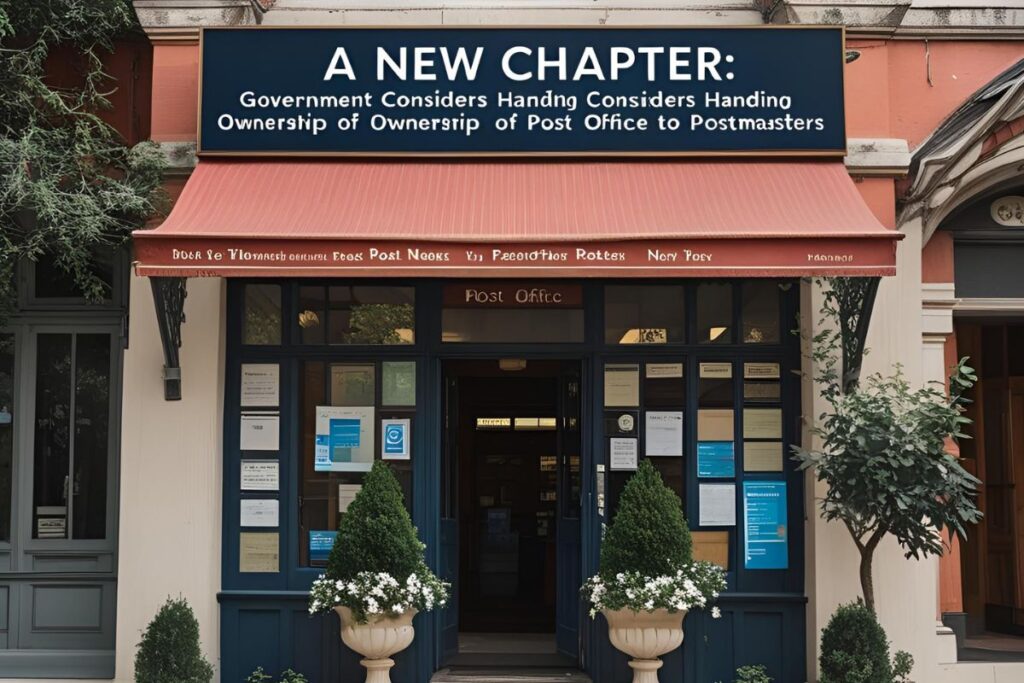
In a major move toward reforming the UK’s state-owned postal network, the government has launched a public consultation on the future of the Post Office, suggesting a mutual ownership model that would place postmasters at the heart of the organisation’s governance.
Post Office Minister Gareth Thomas described the review as an opportunity for a “fresh vision” and made it clear that there are no current plans to reduce the 11,500-strong branch network, which remains one of the most accessible services in the UK.
A Response to Scandal: Restoring Trust After Horizon Fallout
The push for change follows the devastating fallout of the Horizon IT scandal, which saw h undreds of sub-postmasters wrongly convicted of theft and false accounting due to faulty accounting software. The issue resurfaced last week with the release of the first report from the public inquiry, shedding light on the human cost of the miscarriage of justice.
Gareth Thomas told the BBC the goal is to repair deep-rooted cultural and structural failures within the organisation. “This is about fixing the fundamental problems,” he stated, emphasizing that the trust of both the public and postmasters must be restored.
What Is Mutualisation—and Why Now?
The idea of transferring ownership to postmasters through mutualisation isn’t new. First proposed in 2012 after the Post Office was separated from Royal Mail, the concept was shelved as the Horizon scandal came to the forefront.
Now, the government believes mutual o wnership could be the key to rebuilding trust and creating a more transparent, responsive organisation. Two models have been proposed:
- A joint venture between the government and a postmaster-led mutual, potentially including input from employees, customers, and community members.
- A charter model, similar to the governance of the BBC or universities, where the government sets guiding principles but steps back from direct ownership.
A Shift in Culture: Empowering the Front Line
Advocates for mutual ownership say the change could transform how the Post Office operates. Rose Marley, CEO of Co-operatives UK, argued that if postmasters had a stake in ownership, the Horizon scandal might never have reached such a catastrophic scale.
“A stakeholder-led Post Office would be far better placed to surface concerns early and protect those on the front line,” she said. “It would hardwire in a culture of transparency and shared responsibility.”
In mutual organisations, such as John Lewis Partnership and The Co-operative, staff are involved in decision-making and share a sense of ownership, which can lead to improved productivity and morale.
Financial Reality: Profitability and Government Support
Despite its size and presence, the Post Office has struggled to turn a profit, increasingly reliant on tens of millions of pounds in state subsidies as letter volumes drop and digital alternatives rise. Last year, Thomas admitted that nearly half of Post Office branches are either unprofitable or barely breaking even.
To support its transformation, the government has announced an additional £118 million in funding, aiming to help the Post Office achieve financial and operational stability before any structural changes are implemented.
The shift to mutual ownership is unlikely before 2030, as the government focuses on replacing the flawed Horizon IT system—a task expected to take three to five years.
Services of the Future: Expanding the Role of the Post Office
Alongside ownership, the consultation invites public input on what services the Post Office should offer going forward, especially as major banks continue to close High Street branches.
Currently, the Post Office offers vital services such as:
- Banking access: deposits and withdrawals for most UK banks
- Currency exchange
- Passport applications
- Welfare benefit forms and payments
However, many of these services are only available at larger or franchised locations. As part of its evolution, the Post Office is transitioning its remaining standalone shops into franchise-based models, where branches are co-located with retail outlets.
Accessibility and Reach: A Lifeline for Communities
Despite the challenges, the Post Office remains a critical community hub. According to official figures:
- 99.7% of the UK population lives within three miles of a Post Office
- 4,000 branches are open seven days a week
- The service provides £5.2 billion in annual social value to households
- It also contributes £1.3 billion to small and medium-sized businesses
These figures underscore the Post Office’s role in delivering not just mail, but also social and economic stability—especially in rural and underserved areas.
A National Conversation: Shaping the Future of the Post Office
The 12-week consultation period aims to open up a national dialogue. Key questions include:
- Should the Post Office maintain its 11,500 branches?
- What services should it offer as community needs evolve?
- Is mutual or charter-based ownership the best path forward?
Minister Gareth Thomas has encouraged stakeholders—from c ustomers and employees to local business owners—to have their say in shaping the future of one of the UK’s most trusted public services.
Conclusion: A Crossroads for a British Institution
The Post Office stands at a pivotal moment in its history. With the Horizon scandal exposing cracks in its foundation, the government’s proposal for mutual ownership signals a bold step toward reform, transparency, and accountability.
While major changes may take years to implement, the consultation marks the beginning of a journey to rebuild public trust, empower postmasters, and modernise the service for future generations.
Keywords: Post Office mutual ownership, postmasters ownership UK, Horizon scandal reform, future of Post Office services, UK government public consultation, Post Office banking services, Post Office transformation plan, franchise Post Office model, Gareth Thomas Post Office, Co-operatives UK recommendations.






